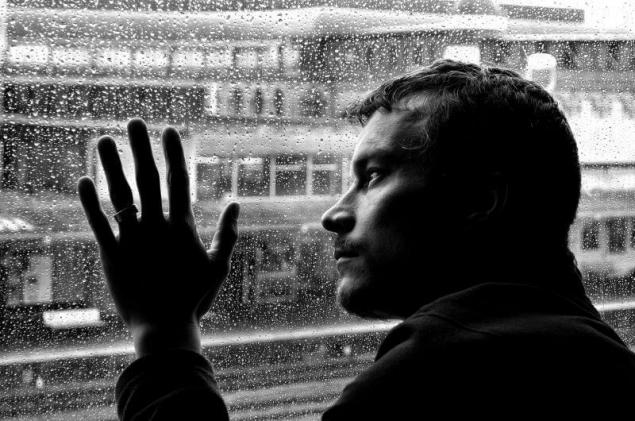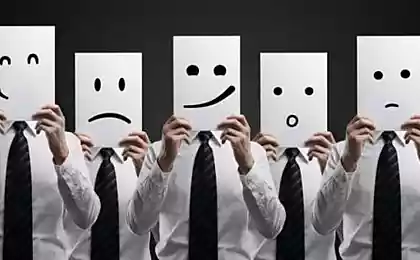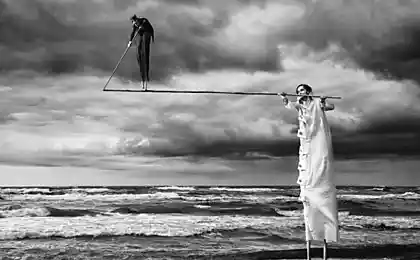429
Find out what the TRUE desire behind Your negative emotions
Anger.
If you do not get what you want unconsciously (instinctively) can cause a sense of anger, to force another person to obey you. So, anger helps you to take control of the situation. Anger helps to get the upper hand in the dispute, to even up the score, to avenge their failures. Anger can also be used to protect their rights. With anger give the enemy to understand that he needs to retreat. Anger at yourself can be a way to force yourself to do something, to take up the case or the work that I'm afraid. Anger is also the trigger for the beginning of action (to go on a diet, for example). Or a way to punish yourself for failure.

Sadness, longing.
This is our way to Express dissatisfaction with their achievements. And how to react to their disappointment in other people or situation. Can also be a form of manifestation of compassion. Sorry that someone had an accident, and sadness to Express your attitude, your reaction.
Irritation.
This is a weak form of anger. Occurs when someone's behavior provokes and makes you nervous. Serves as a demonstration of discontent, to stop something that bothers us. Help us to stop the stagnation and motivate yourself to action. In all cases the irritation lies the desire to bring the situation under control. Ie, we get annoyed when everything is not as we said.
A sense of guilt.
This form of punishment yourself. Sometimes it helps us to avoid responsibility for their mistakes. Yes, feel guilty, repent, and don't need anything else to do. Sometimes guilt is the expression of superiority: I'm so highly developed that even to suffer for their misguided actions. Guilt is a very destructive emotion, it signals that something needs to change in yourself. You need to understand where it came from: imposed on us by education, and therefore uncaused, or we really did something unsightly. Then you need to analyze the cause of action, to truly forgive yourself and promise that it won't happen again. It will be good if we compensate the damage or apologize to those who were offended.

Disappointment.
Designed to manifest the displeasure in situations where you don't get what you want.
Fear or anxiety.
These emotions are associated with the instinct of self-preservation. Their task is to protect us, to prevent dangerous situations. Fear "draws" pictures of the surprises and obstacles that our failure and bankruptcy. But his task is not to disturb you, but to help: to warn of danger, to show the real situation, to indicate where may lurk the pitfalls, so we were prepared for difficulties. So stupid to ignore the fear and go ahead. And anxiety can be a feeling. It is necessary to find a grain of truth in those emotions. Then they change the polarity, charge us with energy and compel us to action.
Despair.
Occurs when repeated trial and effort to achieve anything not brought the desired results.Despair is a deep discouragement, which "gives us the right" to refuse further attempts.
Apathy.
It's a delicate mild form of rebellion against something. Show, as a rule, those who do not have the strength or the opportunity to rebel openly. A passive demonstration of power and disagreement.

Depression.
This is also a form of taking control. Unpaid suspension, drop out of the flow of life. The surrounding can not do anything to get you to do, and forced to assume your responsibilities. Sometimes depression is a passive form of expressing rage.Becomes an instrument of a sophisticated manipulation of others, and works perfectly, evoking a sense of guilt from the person to whom it is addressed.
Depression.
Mean that you have to allow yourself to take a break in the activities. Or there is a strong inner need to give up something. Perhaps you are just tired. published
P. S. And remember, only by changing their consumption — together we change the world! © Join us at Facebook , Vkontakte, Odnoklassniki
Source: vk.com/badpsycho?w=wall-31862851_62295
If you do not get what you want unconsciously (instinctively) can cause a sense of anger, to force another person to obey you. So, anger helps you to take control of the situation. Anger helps to get the upper hand in the dispute, to even up the score, to avenge their failures. Anger can also be used to protect their rights. With anger give the enemy to understand that he needs to retreat. Anger at yourself can be a way to force yourself to do something, to take up the case or the work that I'm afraid. Anger is also the trigger for the beginning of action (to go on a diet, for example). Or a way to punish yourself for failure.

Sadness, longing.
This is our way to Express dissatisfaction with their achievements. And how to react to their disappointment in other people or situation. Can also be a form of manifestation of compassion. Sorry that someone had an accident, and sadness to Express your attitude, your reaction.
Irritation.
This is a weak form of anger. Occurs when someone's behavior provokes and makes you nervous. Serves as a demonstration of discontent, to stop something that bothers us. Help us to stop the stagnation and motivate yourself to action. In all cases the irritation lies the desire to bring the situation under control. Ie, we get annoyed when everything is not as we said.
A sense of guilt.
This form of punishment yourself. Sometimes it helps us to avoid responsibility for their mistakes. Yes, feel guilty, repent, and don't need anything else to do. Sometimes guilt is the expression of superiority: I'm so highly developed that even to suffer for their misguided actions. Guilt is a very destructive emotion, it signals that something needs to change in yourself. You need to understand where it came from: imposed on us by education, and therefore uncaused, or we really did something unsightly. Then you need to analyze the cause of action, to truly forgive yourself and promise that it won't happen again. It will be good if we compensate the damage or apologize to those who were offended.

Disappointment.
Designed to manifest the displeasure in situations where you don't get what you want.
Fear or anxiety.
These emotions are associated with the instinct of self-preservation. Their task is to protect us, to prevent dangerous situations. Fear "draws" pictures of the surprises and obstacles that our failure and bankruptcy. But his task is not to disturb you, but to help: to warn of danger, to show the real situation, to indicate where may lurk the pitfalls, so we were prepared for difficulties. So stupid to ignore the fear and go ahead. And anxiety can be a feeling. It is necessary to find a grain of truth in those emotions. Then they change the polarity, charge us with energy and compel us to action.
Despair.
Occurs when repeated trial and effort to achieve anything not brought the desired results.Despair is a deep discouragement, which "gives us the right" to refuse further attempts.
Apathy.
It's a delicate mild form of rebellion against something. Show, as a rule, those who do not have the strength or the opportunity to rebel openly. A passive demonstration of power and disagreement.

Depression.
This is also a form of taking control. Unpaid suspension, drop out of the flow of life. The surrounding can not do anything to get you to do, and forced to assume your responsibilities. Sometimes depression is a passive form of expressing rage.Becomes an instrument of a sophisticated manipulation of others, and works perfectly, evoking a sense of guilt from the person to whom it is addressed.
Depression.
Mean that you have to allow yourself to take a break in the activities. Or there is a strong inner need to give up something. Perhaps you are just tired. published
P. S. And remember, only by changing their consumption — together we change the world! © Join us at Facebook , Vkontakte, Odnoklassniki
Source: vk.com/badpsycho?w=wall-31862851_62295























